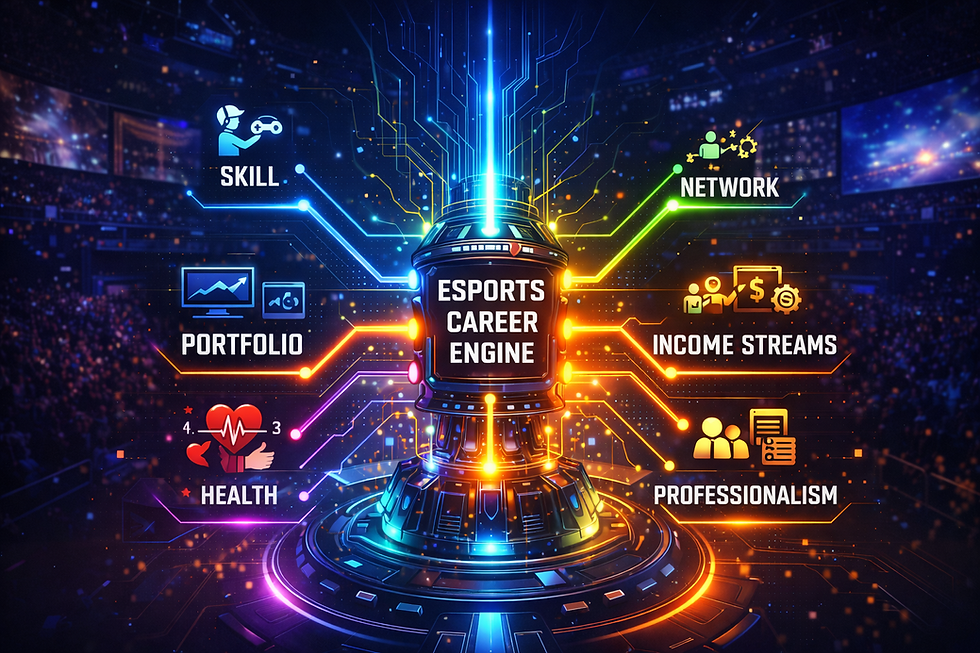Esports for Kids
- Dr. Brian J

- May 23, 2023
- 4 min read
Updated: Feb 9, 2025

Introduction
In a world where esports are becoming more popular than ever, it's important for parents to know how to help their kids enjoy the game. Video games can be a great way for kids to learn about teamwork and problem-solving skills, as well as improve their hand-eye coordination. However, there are also some downsides when it comes to playing video games at home: some games may encourage violence or even gambling; others may not be appropriate for children under 12 years old; and some games can keep kids hooked on them for hours without giving them any other activities beyond sitting in front of their computer screens. So what should you do if your child wants to play an online game but isn't sure whether it's safe? We'll cover some tips below—but first let's explore why esports matter so much!
An introduction to esports
Esports are a type of competitive video game. They're played professionally on live television, broadcasted online and at venues all around the world.
If you're not familiar with esports, it's worth bearing in mind that this isn't just an activity for kids—it's actually quite popular among adults as well! The most common games are League of Legends (a MOBA) and Counter-Strike: Global Offensive (a multiplayer first-person shooter). But there are also other games such as Hearthstone or StarCraft II being played by fans around the world online who compete against each other. Esports competitions can be watched by millions of people across the globe thanks to livestreaming services like Youtube TV; however, if you want something more intimate and personal then attending an event could be better suited for your needs!
How to play video games safely at home
Make sure you have a safe place to play.
Play with friends, or in a group
Set rules for the games you play. For example, don’t let them watch you play online because it could be distracting for them and make it hard for them to join in later on if they need help with something that's hard for both of them (like typing).
Set limits on how long each game lasts so that everyone has enough time before needing another break from playing together again—and then set those breaks into motion before things get too intense! Be careful not to go overboard with this one: remember that while some people may enjoy spending hours at a time playing video games together without taking any breaks between rounds (or even just missings out altogether), others will find themselves getting frustrated over being unable as much as they want because their partner isn't letting anyone else join in either...so there needs to be some kind of balance here somehow."
Esports events for kids
Esports events are on the rise. Kids are starting to get in on the action, and you can find your local event at [this website]. The games themselves have been around for decades, but they've recently gained popularity with more people playing them than ever before. Esports is a fast-paced, competitive form of gaming where players compete against each other by using their computers or consoles to play video games like League of Legends or Dota 2 (the latter being one of my personal faves). It's an exciting way for kids (and adults) alike to spend time together while having fun!
Video game resources for kids of all ages
There are many resources out there to help you learn more about esports and video games. Here are a few things to keep in mind:
The Esports Competitions website has information on all kinds of tournaments, including those for kids.
The Entertainment Software Association (ESA) is an organization that brings together video game developers, publishers, hardware manufacturers and other industry partners to promote the value of interactive entertainment through advocacy efforts like education initiatives or public policy work. ESA provides resources on how to get involved with esports or gaming events like expos where exhibitors will be showing off their latest products.* You can also search online for local gaming competitions near you!
Esports have benefits for kids, but it's important to make sure kids are playing them safely.
It's important to talk to your kids about esports. They'll want to know what it is, how it works and what the rules are. If you don't already have an esports league in your area, then look into starting one!
Make sure that whatever league or event your child is playing at has a safe environment for all of their players. You can do this by making sure there are no cheaters or hackers on the field/stage or even just by reporting them so they can be removed from participating in future events.
Also make sure that every player has fun during their time playing at these events!
Conclusion
You don’t have to be a parent to see the value in esports for kids. As we’ve seen, there are countless benefits of playing video games—and it can help them learn how to work together and communicate effectively with others. In addition, certain games may even encourage kids to develop their creativity by using their imaginations in virtual environments. For those who want more out of their time spent gaming than just fun, competitive experiences (or even just socializing with friends), esports is an excellent way to engage with this exciting world while still getting some exercise along the way!



